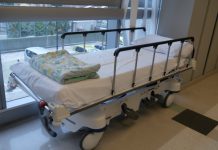What is intermittent claudication? Relief for “Angina of the Legs” Dressed in shots and trainers, you step outside and breathe in the fresh spring air. You head toward the park for a daily walk. As you reach the first junction, you pick up speed, swinging your arms and striding confidently. Ten minutes later, a cramp in your calf stops you cold. You massage the leg, wait a couple of minutes, and then resume walking, but more slowly this time. That scenario is familiar to women with intermittent claudication.
The leg arteries carrying blood from the heart and lungs become so narrowed by cholesterol deposits that blood (with its energizing cargo of oxygen) has difficulty getting through. So you feel pain. It seems the angina of the legs The oxygen supply to calf muscles is temporarily insufficient, causing a cramped feeling. Older men and women with heart disease are most susceptible.
Here’s what you can do. Intermittent claudications are brought on by walking, and they’re relieved by rest. Essentially, your legs have worked so hard to walk that they have run out of air. So all you have to do is stop walking for a minute or two; blood flow will be restored, oxygen will saturate your muscles, and the pain will disappear.
Contradictory though it may seem, exercise can actually build a small network of collateral blood vessels that bypass the clogged arteries in you’re leg and give muscles an alternate supply of oxygen. So even though walking can trigger occasional bouts of intermittent claudications, you still need to walk to build a natural bypass. The trick is to walk right up to the moment that you feel pain and stop until the pain stops.
Then resume movement. Building new blood vessels takes time, but walking every day, as often as you can, eventually pays off. You will find that, in time, you can walk farther and do more before pain sets in. Seek a smoke-free environment because cigarette smoke decreases the amount of oxygen available to your muscles, triggering the onset of intermittent claudications.
You need to see a doctor when calf pain triggered by walking should be evaluated by a doctor but does not indicate an emergency. If you have calf pain with very little walking or if the pain occurs while you are at rest, you should see a doctor at once. You should consult your doctor if you know you have intermittent claudication and leg pain wakes you up at night. You should suddenly develop cold, numb, or painful feet or legs.

Product You May be Interested in
-
Crush Food Cravings with Odd Water Hack and Melt 62lbs
-
Flavor Pairing Ritual Supercharges Women’s Metabolisms
-
The best Keto Diet Program






